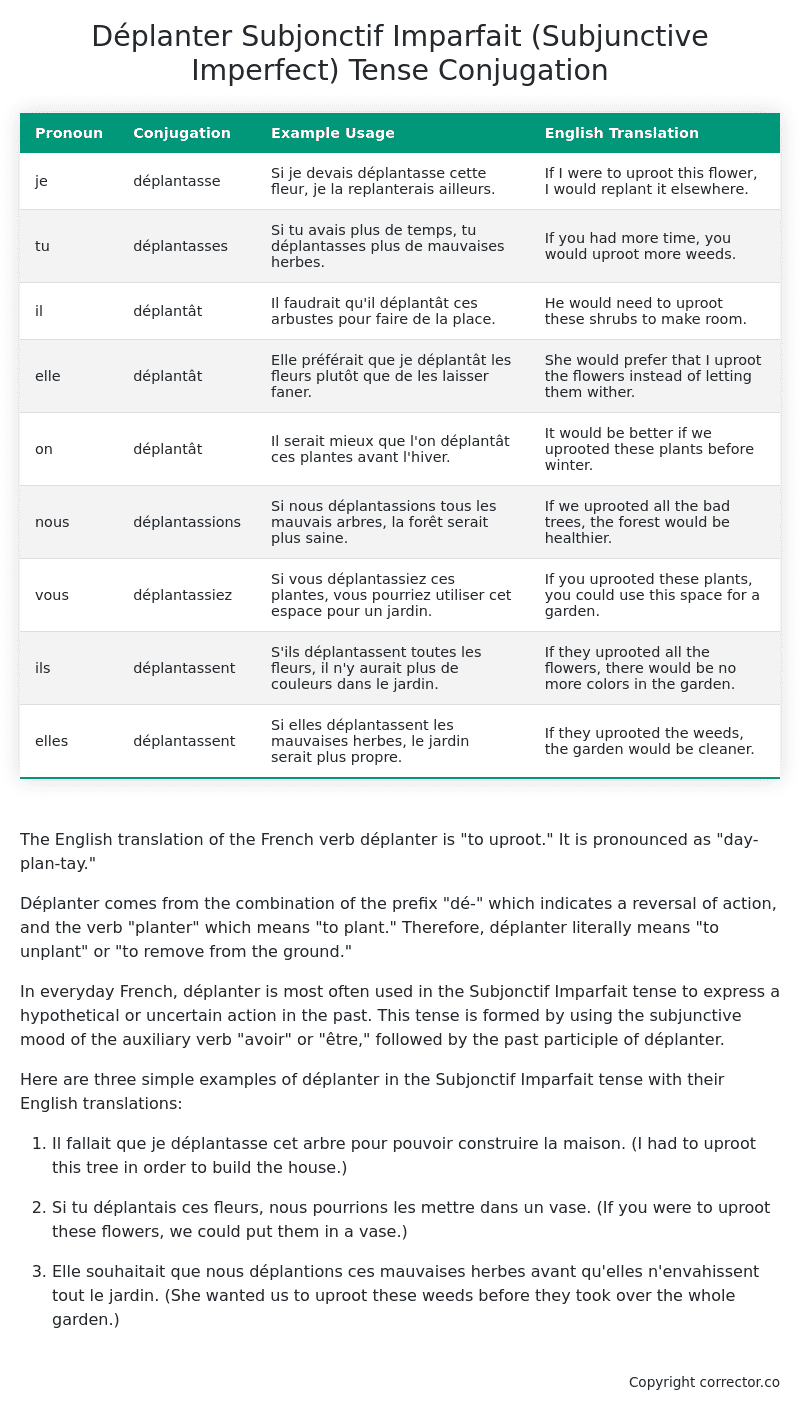Subjonctif Imparfait (Subjunctive Imperfect) Tense Conjugation of the French Verb déplanter
Introduction to the verb déplanter
The English translation of the French verb déplanter is “to uproot.” It is pronounced as “day-plan-tay.”
Déplanter comes from the combination of the prefix “dé-” which indicates a reversal of action, and the verb “planter” which means “to plant.” Therefore, déplanter literally means “to unplant” or “to remove from the ground.”
In everyday French, déplanter is most often used in the Subjonctif Imparfait tense to express a hypothetical or uncertain action in the past. This tense is formed by using the subjunctive mood of the auxiliary verb “avoir” or “être,” followed by the past participle of déplanter.
Here are three simple examples of déplanter in the Subjonctif Imparfait tense with their English translations:
-
Il fallait que je déplantasse cet arbre pour pouvoir construire la maison. (I had to uproot this tree in order to build the house.)
-
Si tu déplantais ces fleurs, nous pourrions les mettre dans un vase. (If you were to uproot these flowers, we could put them in a vase.)
-
Elle souhaitait que nous déplantions ces mauvaises herbes avant qu’elles n’envahissent tout le jardin. (She wanted us to uproot these weeds before they took over the whole garden.)
Table of the Subjonctif Imparfait (Subjunctive Imperfect) Tense Conjugation of déplanter
| Pronoun | Conjugation | Example Usage | English Translation |
|---|---|---|---|
| je | déplantasse | Si je devais déplantasse cette fleur, je la replanterais ailleurs. | If I were to uproot this flower, I would replant it elsewhere. |
| tu | déplantasses | Si tu avais plus de temps, tu déplantasses plus de mauvaises herbes. | If you had more time, you would uproot more weeds. |
| il | déplantât | Il faudrait qu’il déplantât ces arbustes pour faire de la place. | He would need to uproot these shrubs to make room. |
| elle | déplantât | Elle préférait que je déplantât les fleurs plutôt que de les laisser faner. | She would prefer that I uproot the flowers instead of letting them wither. |
| on | déplantât | Il serait mieux que l’on déplantât ces plantes avant l’hiver. | It would be better if we uprooted these plants before winter. |
| nous | déplantassions | Si nous déplantassions tous les mauvais arbres, la forêt serait plus saine. | If we uprooted all the bad trees, the forest would be healthier. |
| vous | déplantassiez | Si vous déplantassiez ces plantes, vous pourriez utiliser cet espace pour un jardin. | If you uprooted these plants, you could use this space for a garden. |
| ils | déplantassent | S’ils déplantassent toutes les fleurs, il n’y aurait plus de couleurs dans le jardin. | If they uprooted all the flowers, there would be no more colors in the garden. |
| elles | déplantassent | Si elles déplantassent les mauvaises herbes, le jardin serait plus propre. | If they uprooted the weeds, the garden would be cleaner. |
Other Conjugations for Déplanter.
Le Present (Present Tense) Conjugation of the French Verb déplanter
Imparfait (Imperfect) Tense Conjugation of the French Verb déplanter
Passé Simple (Simple Past) Tense Conjugation of the French Verb déplanter
Passé Composé (Present Perfect) Tense Conjugation of the French Verb déplanter
Futur Simple (Simple Future) Tense Conjugation of the French Verb déplanter
Futur Proche (Near Future) Tense Conjugation of the French Verb déplanter
Plus-que-parfait (Pluperfect) Tense Conjugation of the French Verb déplanter
Passé Antérieur (Past Anterior) Tense Conjugation of the French Verb déplanter
Futur Antérieur (Future Anterior) Tense Conjugation of the French Verb déplanter
Subjonctif Présent (Subjunctive Present) Tense Conjugation of the French Verb déplanter
Subjonctif Passé (Subjunctive Past) Tense Conjugation of the French Verb déplanter
Subjonctif Imparfait (Subjunctive Imperfect) Tense Conjugation of the French Verb déplanter (this article)
Subjonctif Plus-que-parfait (Subjunctive Pluperfect) Tense Conjugation of the French Verb déplanter
Conditionnel Présent (Conditional Present) Tense Conjugation of the French Verb déplanter
Conditionnel Passé (Conditional Past) Tense Conjugation of the French Verb déplanter
L’impératif Présent (Imperative Present) Tense Conjugation of the French Verb déplanter
L’infinitif Présent (Infinitive Present) Tense Conjugation of the French Verb déplanter
Struggling with French verbs or the language in general? Why not use our free French Grammar Checker – no registration required!
Get a FREE Download Study Sheet of this Conjugation 🔥
Simply right click the image below, click “save image” and get your free reference for the déplanter Subjonctif Imparfait tense conjugation!

Déplanter – About the French Subjonctif Imparfait (Subjunctive Imperfect) Tense
Formation
Common Everyday Usage Patterns
Interactions with Other Tenses
Subjonctif Présent
Indicatif Passé Composé
Conditional
Conditional Perfect
Summary
I hope you enjoyed this article on the verb déplanter. Still in a learning mood? Check out another TOTALLY random French verb conjugation!


